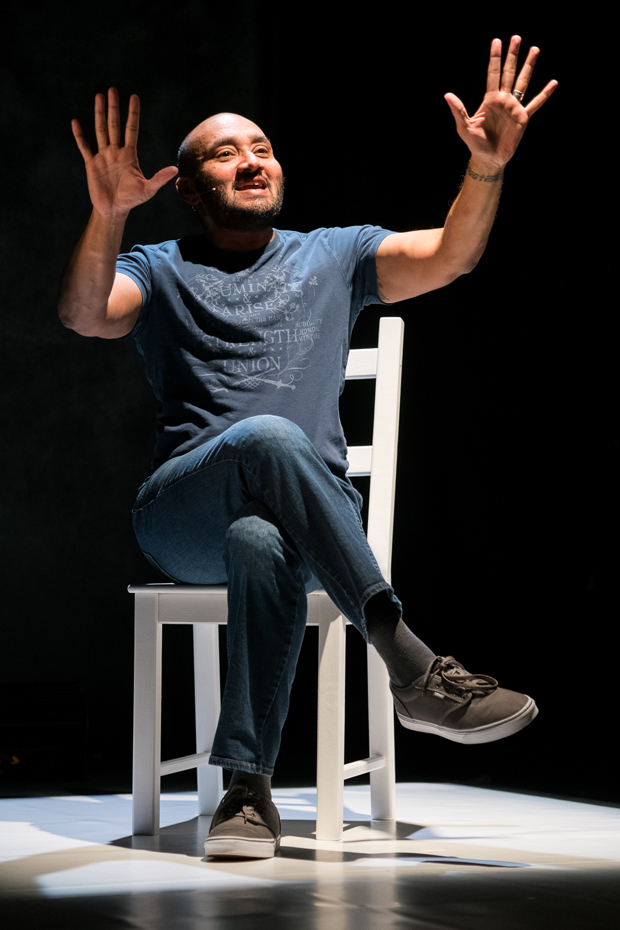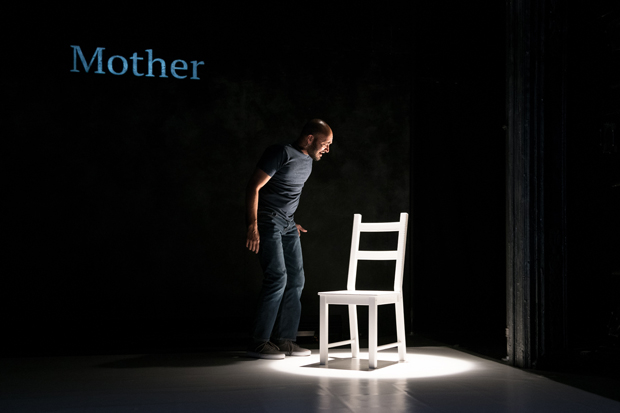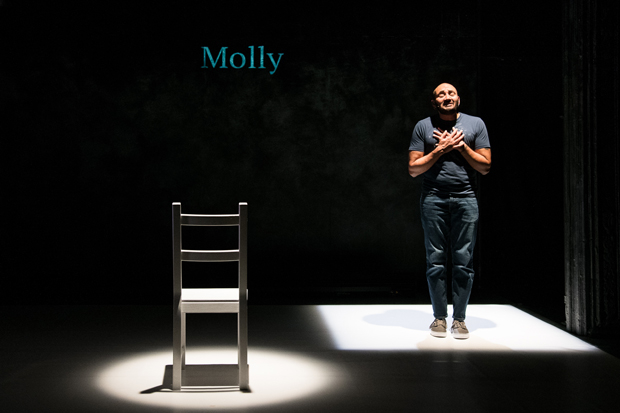Draw the Circle

(© Russ Rowland)
With Mashuq Mushtaq Deen's Draw the Circle making its New York premiere at Rattlestick Playwrights Theater, and Dael Orlandersmith's Until the Flood still playing (through February 18) at the same venue, that means audiences now have a chance to see two exemplary solo shows that speak to two of the most divisive issues in American society today: racism in Until the Flood and the transgender experience in Draw the Circle. Deen takes the more personal route of the two, making his own often anguished experience of female-to-male transitioning the subject of his play. Instead of offering a first-person account, however, Deen tells his story through the perspectives of everyone around him: his conservative parents and other assorted family members, his girlfriend Molly, friends and acquaintances, even a stranger in Costa Rica who (it's implied) raped him before his transition.
The result is an insightful work that is noteworthy for the compassion with which the playwright-performer explores viewpoints different from his own. Deen's Muslim Indian mother and father may be rigidly traditional in their views of gender and societal norms, to the point of refusing to speak to their son for a few years, but by daring to embody them onstage, Deen forces us to look at his experience through their eyes, refusing to offer us the safety net of judgmental distance. More revelatory in Draw the Circle is the struggle for acceptance Deen dramatizes even among those who accept his transition. Even Molly, having fallen in love with Deen when he was still Shireen, finds herself having trouble accepting him as a man in the early stages of his transition, going so far as to wonder why he wasn't willing to simply accept himself as he was before.

(© Russ Rowland)
Deen effortlessly weaves between those and many other characters in Draw the Circle, without any break between segments (he wears the same blue T-shirt and jeans throughout), and with only the projection of names on a black background indicating what character he's inhabiting at a given moment. The agility with which he jumps from one character to another is dazzling, but it's the humane understanding he brings to his portrayals that impress the most. With Deen, even the most intolerant of characters are allowed to come across as warmly sympathetic in their own ways.
Director and set designer Chay Yew has given Deen a minimalist backdrop for this patchwork quilt of voices: Onstage, there's only Deen and a white chair that occasionally doubles as a stand-in for Deen himself whenever the performer holds and caresses it as if it were a real person. Mary Louise Geiger's lighting design is utilitarian at best, the square spotlight trained on Deen throughout as he moves across the stage. Only Matt M. Nielson's nearly imperceptible sound design — with ambient noises pitched so softly that it takes a while to notice the soundscapes quietly humming throughout the theater — provides the closest Draw the Circle comes to theatrical inventiveness. That's hardly a slam, however; Deen's impassioned performance is enough to hold our interest.
"Write what you know" is the common maxim offered to aspiring writers, and certainly there's something to be said for the kind of authenticity that can come with a work of art borne out of an artist's own personal experience. But while it's relatively easy to write about oneself, however directly or thinly veiled, it's even more challenging — and arguably, even more valuable — to look beyond one's own personal purview and truly grapple with other points of view. The story of personal anguish and eventual self-realization Deen tells in Draw the Circle would have made for a moving experience as a memoir, to be sure. But by telling his story through the perspectives of those around him, he achieves that high artistic aim of locating broader universal import in a deeply specific tale. As a result, Deen fully earns his chilling final PSA-like gesture of presenting a scroll of recent victims of violence against transgender people as he stands in front of us shirtless. He may be a survivor, but considering the angst and intolerance he has so vividly enacted for us, he could easily have been one of those victims.

(© Russ Rowland)










